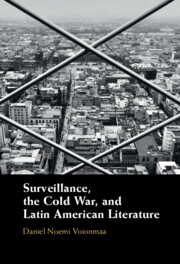Book contents
- Surveillance, the Cold War, and Latin American Literature
- Surveillance, the Cold War, and Latin American Literature
- Copyright page
- Dedication
- Contents
- Figures
- Preface
- Acknowledgments
- Chapter 1 Seeing It All
- Chapter 2 Latin American Archives and Human Matter
- Chapter 3 Cultural Cold War
- Chapter 4 Spying and Knowledge
- Chapter 5 Reading Like a Spy
- Chapter 6 Writing Like a Spy
- Chapter 7 Spying Like a Writer
- Conclusion
- Notes
- Bibliography
- Index
Chapter 5 - Reading Like a Spy
Censorship in Chile
Published online by Cambridge University Press: 18 August 2022
- Surveillance, the Cold War, and Latin American Literature
- Surveillance, the Cold War, and Latin American Literature
- Copyright page
- Dedication
- Contents
- Figures
- Preface
- Acknowledgments
- Chapter 1 Seeing It All
- Chapter 2 Latin American Archives and Human Matter
- Chapter 3 Cultural Cold War
- Chapter 4 Spying and Knowledge
- Chapter 5 Reading Like a Spy
- Chapter 6 Writing Like a Spy
- Chapter 7 Spying Like a Writer
- Conclusion
- Notes
- Bibliography
- Index
Summary
Chapter 5 begins with an overview of the ideology of the Chilean dictatorship (1973-1990). It then uses files from the secret police (CNI) and documents from the Ministry of Interior and the Ministry of Education to study several cases of censorship during the dictatorship. First, a secret police report on a book about torture in Chile published by Amnesty International in 1983. Second, a memorandum from Division of Social Communication that includes a Colonel’s criticism of a poem by Rubén Campos Aragón in 1976. And third, a thorough analysis, a “Sociological Appreciation,” of the transition to democracy written by a Captain of the Navy, in December 1988, right after Pinochet’s defeat in a referendum. In the first two cases, the focus is on how agents analyzed the language of the censored texts. In the third, on how language is used to characterize the political and social situation.
- Type
- Chapter
- Information
- Surveillance, the Cold War, and Latin American Literature , pp. 103 - 120Publisher: Cambridge University PressPrint publication year: 2022

